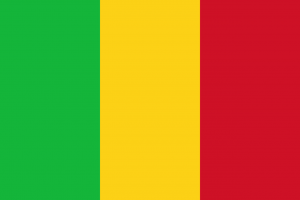Difference between revisions of "Language/Bambara/Grammar/Adjectives"
m (Quick edit) |
|||
| (3 intermediate revisions by one other user not shown) | |||
| Line 9: | Line 9: | ||
__TOC__ | __TOC__ | ||
<span link>Take a moment to explore these relevant pages as you conclude this lesson: [[Language/Bambara/Grammar/Pronouns|Pronouns]] & [[Language/Bambara/Grammar/Questions|Questions]].</span> | |||
== Adjective agreement == | == Adjective agreement == | ||
In Bambara, adjectives agree with the gender and number of the noun they describe. There are two genders in Bambara: masculine and feminine. The plural form is also used for groups that include both genders. Here are some examples: | In Bambara, adjectives agree with the gender and number of the noun they describe. There are two genders in Bambara: masculine and feminine. The plural form is also used for groups that include both genders. Here are some examples: | ||
| Line 56: | Line 58: | ||
* Person 2: Aa, aw ni mɔgɔya, kɛ ni falan. (Yes, it's red, but it's also cheap.) | * Person 2: Aa, aw ni mɔgɔya, kɛ ni falan. (Yes, it's red, but it's also cheap.) | ||
{{#seo: | {{#seo: | ||
|title=Bambara Grammar - Adjectives | |title=Bambara Grammar - Adjectives | ||
| Line 64: | Line 65: | ||
<hr>➡ If you have any questions, please ask them in the comments section below.<br>➡ Feel free to edit this wiki page if you think it can be improved. 😎 | <hr>➡ If you have any questions, please ask them in the comments section below.<br>➡ Feel free to edit this wiki page if you think it can be improved. 😎 | ||
==Videos== | ==Videos== | ||
| Line 71: | Line 70: | ||
===Adjectives in Bambara/Dioula | Basic Bambara 18 - YouTube=== | ===Adjectives in Bambara/Dioula | Basic Bambara 18 - YouTube=== | ||
<youtube>https://www.youtube.com/watch?v=DvTwwBXME40</youtube> | <youtube>https://www.youtube.com/watch?v=DvTwwBXME40</youtube> | ||
==Other Lessons== | |||
* [[Language/Bambara/Grammar/How-to-Use-Be|How to Use Be]] | |||
* [[Language/Bambara/Grammar/Pronouns|Pronouns]] | |||
* [[Language/Bambara/Grammar/Give-your-Opinion|Give your Opinion]] | |||
* [[Language/Bambara/Grammar/Conditional-Mood|Conditional Mood]] | |||
* [[Language/Bambara/Grammar/Questions|Questions]] | |||
* [[Language/Bambara/Grammar/Plurals|Plurals]] | |||
* [[Language/Bambara/Grammar/Negation|Negation]] | |||
* [[Language/Bambara/Grammar/How-to-Use-Have|How to Use Have]] | |||
<span class='maj'></span> | |||
==Sources== | |||
* [https://user.uni-frankfurt.de/~tezimmer/HP_FG-RelS/PDF/The%20Structure%20of%20Bambara_Handout_Budapest%20Mai%202013.pdf The Structure of Bambara1] | |||
{{Bambara-Page-Bottom}} | {{Bambara-Page-Bottom}} | ||
<span links></span> | |||
Latest revision as of 20:58, 12 May 2023
Hi Bambara learners! 😊
In this lesson, we will be talking about adjectives in Bambara. Adjectives are words that describe nouns and pronouns. For example, in the sentence "the red car is fast", "red" is the adjective that describes the car. Adjectives in Bambara follow the noun they describe and agree with the noun in gender and number.
Take a moment to explore these relevant pages as you conclude this lesson: Pronouns & Questions.
Adjective agreement[edit | edit source]
In Bambara, adjectives agree with the gender and number of the noun they describe. There are two genders in Bambara: masculine and feminine. The plural form is also used for groups that include both genders. Here are some examples:
| Bambara | Pronunciation | English |
|---|---|---|
| tɔgɔ | taw-go | big (masculine singular) |
| wuli | woo-lee | small (masculine singular) |
| kura | koo-rah | hot (feminine singular) |
| kali | kah-lee | cold (feminine singular) |
| tɔgɔ-tigui | taw-go-tee-gee | big (masculine plural) |
| wuli-wari | woo-lee-waa-ree | small (masculine plural) |
| kura-koroni | koo-rah-koh-roh-nee | hot (feminine plural) |
| kali-koroni | kah-lee-koh-roh-nee | cold (feminine plural) |
Notice that the adjective agrees with the gender and number of the noun it modifies. For example, "tɔgɔ" (big) becomes "tɔgɔ-tigui" in the plural masculine, and "kura" (hot) becomes "kura-koroni" in the plural feminine.
Placement of adjectives[edit | edit source]
In Bambara, adjectives usually come after the noun they describe. For example, "aw ye fɔlɔ lwili" means "the small dog". "Fɔlɔ" means "dog", and "lwili" means "small". However, adjectives can come before the noun for emphasis or clarification. For example, "lwili fɔlɔ bɛn bɛ" means "the small dog is over there". "Lwili" comes before "fɔlɔ" to emphasize that the dog is small.
Comparison of adjectives[edit | edit source]
In Bambara, there are three levels of comparison for adjectives: positive, comparative, and superlative. Here is an example of each:
- Positive: Muso ye tɔgɔ. (The mouse is big.)
- Comparative: Muso ye tɔgɔra. (The mouse is bigger.)
- Superlative: Muso ye tɔgɔra dɛ bɛ fɛ. (The mouse is the biggest of all.)
To form the comparative and superlative, we add "-ra" to the end of the adjective. The word "dɛ" means "of all" and is used to indicate the superlative.
Practice dialogue[edit | edit source]
To help you practice using adjectives in Bambara, here is a dialogue between two friends:
- Person 1: Aw ye kura hɛrɛyɛ? (Is the food hot?)
- Person 2: Aa, aw ye kura! (Yes, the food is hot!)
- Person 1: Aw ye tɔgɔna kɔrɔ. (The big car is fast.)
- Person 2: Wo, tɔgɔna ye, kɔrɔ ye! (Wow, it's big and fast!)
- Person 1: Tigɛ kɛ, mago ye mɔgɔya. (Look at that red shirt.)
- Person 2: Aa, aw ni mɔgɔya, kɛ ni falan. (Yes, it's red, but it's also cheap.)
➡ If you have any questions, please ask them in the comments section below.
➡ Feel free to edit this wiki page if you think it can be improved. 😎
Videos[edit | edit source]
Adjectives in Bambara/Dioula | Basic Bambara 18 - YouTube[edit | edit source]
Other Lessons[edit | edit source]
- How to Use Be
- Pronouns
- Give your Opinion
- Conditional Mood
- Questions
- Plurals
- Negation
- How to Use Have
Sources[edit | edit source]
